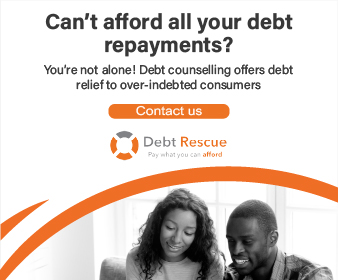Many moons ago, when my late husband was romancing me from South Africa, while I was teaching in Taiwan, he decided that chatting on the computer at the internet cafe was not going to be enough. These were the days before our modern WhatsApp chats. We had mobile phones back in 2002, but they could just call or text.
He decided to call.
I’ll always cherish that he made the effort to communicate with me like that, but it was bad news for his phone bill. He took out a loan, which we affectionately named “the loan shark,” and it took him a while to pay it back. But, the connection was made. I had fallen for him. We got engaged when I returned to SA.
Whatever you find yourself, you might be in a position where you are considering a loan. Before you take that step, make sure that you are educated about all your options, and choose the best personal loan for you and your circumstances.

Understanding Personal Loans
A personal loan is when you borrow a lump sum of money to pay for your own variety of personal expenses and repay those funds in regular installments over time.
Some reasons to get a personal loan, according to Investopedia, are: debt consolidation, home improvements, moving expenses, medical expenses, a large purchase (e.g. a lounge suite), wedding expenses, startup business costs, tax bills, divorce expenses and adoption costs.
Types of Personal Loans Available
Secured vs Unsecured Loans
A secured loan requires some sort of valuable asset (such as a house). An unsecured loan doesn’t require this, but they do look at your creditworthiness. Generally, a secured loan will have a lower interest rate. It’s easier to repossess a house.
An easy example of this is comparing a home loan and a credit card. Brett always used to rather take money out of the bond because it had a better interest rate. The credit card has a higher interest rate.
Fixed vs Variable Interest Rates

Interest is what you are paying for the loan. It’s often factored by how much money you are borrowing, over what time you are paying it back, and your own credit status. But there is another element you have control over: whether you want to choose to pay one flat fee every month, or tie that payment to the interest rate.
From the Standard Bank website:
The prime interest rate is the benchmark interest rate that banks and financial institutions use to set the interest they charge you on loans and credit cards. Prime is linked to the repo rate and therefore can go up or down, influencing how much interest you’re paying.
Fixed interest is easier to budget for, and you won’t be affected by interest rate increases. But if it goes down, your payment stays the same. It could work out more expensive, depending on the condition of those rates.
Variable interest is great when interest rates are low, but could be challenging if they increase. The uncertainty might also make things difficult to predict your budget.
Short-term vs Long-term Loans
A short term loan is typically less than a year. Something unexpected has come up e.g. your car broke down. You just need to spread that extra expense over a few months. A short term loan is often unsecured, according to the Fasta website, which makes it easier to get.
A longer term loan is for a bigger amount of money, that you need to spread over years. Think home loans, vehicle financing and big hospital expenses.
Best Personal Loans Options in South Africa
1. Banks

There’s a very good post here comparing the big five banks and how they shape up against personal loans.
Payment breaks:
Africa Bank offers an option to choose a break from payment for a month. FNB also allows a January payment break if you are up to date.
Settle early:
There are no penalty fees with FNB if you settle your debt earlier. Absa also allows you to pay extra to pay off the debt faster during the year.
Credit Protection:
Retrenchment and death cover are included in a Capitec loan and Absa also makes credit protection available.
2. Credit Unions
A credit union is a self-help financial co-operative where people, who are united by a Common Bond, agree to save money together and, to make loans to one another at low rates of interest. (Cape Credit Union League)
A Google search reveals African Credit Union. Another one came up: Stokvels. There are all different kinds of stokvels – they may be to invest or borrow – but they seem to be a more informal kind of way to borrow money.
3. Online Lenders
There are many online lenders out there. This post on Business Insider says the best for large amounts is LightStream. If you have a very good credit score, SoFi has the best deal. For a lower credit score they recommend Avant. Happy Money’s PayOff online loan is a good option for paying off credit card debt. Another one that will accept a low credit score, but won’t give you a lot of money is Upstart.
In this video, by Emma Lowdown, who specialises in finance and loan content, the top five online loans are: 1. Lime Loans, 2. Fasta, 3. Wonga, 4. MobiKwik, 5. Nifty Credit. The gist of the video is that these are loans that you will be able to get quickly.




Qualification Criteria

Basic criteria (according to the Nedbank website) are 1) Your identify document, 2) Bank statements from the past three months 3) Proof of your salary or proof of employment. Standard bank also wants proof of residence.
You also must be at least 18 years of age.
However, lender-specific age criteria may also apply. If you’re a first-time home buyer, for example, a bank may require you to be at least 35 years of age, and not older than 60; and in some cases, you will need an NQF level 8 qualification, or higher.
Meeting the age requirement doesn’t guarantee loan approval. Younger applicants, in particular, may lose out because of a limited credit history. (Just Money quoting Ayanda Ndimande, strategic business development manager: retail credit at Sanlam.)
He also suggests the following factors:
- Proof of income and bank account.
- Make sure you earn enough to qualify
- Check your credit score. (The higher the better) There are a number of places you can check this e.g. ClearScore and Old Mutual.
- Check your debt to income ratio. e.g. 20% is better than 40%.
How to Choose the Right Personal Loan
When choosing your loan, bear in mind these three factors:
- Interest Rates and Fees
- Loan Terms (duration and read the fine print)
- Customer Service and Support (This is huge. You want to be able to communicate with them).
Common Challenges and Pitfalls
Make sure that you read the fine print and you know what is involved from your side.
It’s also risky to over-borrow or take a loan when they don’t want any credit checks/payslips/bank statements. It’s to everyone’s benefit and safety to ensure these things are in place, so that you don’t over extend yourself.
FAQs
- What are the best personal loans in South Africa?
The best personal loans in South Africa come from reputable institutions offering flexible terms, competitive interest rates, and transparent fees. These include:
- Capitec Bank: Known for lower interest rates and flexible terms. Retrenchment and death cover are included.
- FNB (First National Bank): Offers personal loans with fixed monthly payments and a range of loan amounts. They also offer a January payment break if you are up to date. No penalties if you settle your debt earlier.
- Nedbank: Provides loans with options for consolidating debt and additional benefits for qualifying clients.
- African Bank: Known for its accessible lending criteria and higher loan limits. Also offers a payment break.
- Standard Bank: Offers quick online approvals and personalized loan options.
- Absa: Allows you to pay extra to pay off the debt faster during the year. Credit protection available.
Always compare fees, interest rates, and terms, as well as check for additional benefits like no-penalty early repayment options.
2. Are loans taxable in South Africa?
Loans themselves are not considered taxable income, so you don’t pay tax on the principal amount received. However, if you get a loan with an interest subsidy, such as an employee loan at a below-market rate, the difference in interest may be subject to taxation as a fringe benefit. Additionally, forgiven loans, such as in cases of debt relief or cancellation, might be considered taxable income.
Please see this post for more accurate information.
3. How do personal loans work?
Personal loans in South Africa are typically unsecured, meaning they don’t require collateral. Here’s how they work:
- Application: You apply through a bank or lender by providing information on your income, employment status, and financial history.
- Approval: The lender assesses your credit score, affordability, and overall financial health to determine loan approval and interest rate.
- Repayment: Once approved, you receive the funds and are required to repay them in fixed monthly installments over a set period, with interest.
Interest rates vary based on your credit profile and can be fixed or variable.
4. What type of personal loans do I qualify for?
Eligibility for personal loans depends on several factors:
- Income: Lenders usually have minimum income requirements.
- Credit Score: A good credit score improves your chances and reduces interest rates, but some lenders offer loans to individuals with lower scores at higher rates.
- Employment Status: Being employed or self-employed with consistent income is often required.
- Debt-to-Income Ratio: Your total debt obligations compared to your income should be within a manageable limit.
You may qualify for standard personal loans, debt consolidation loans, or emergency loans, depending on your profile.
5. Where can I get personal loans without credit checks/payslips/bank statements?
Some lenders provide more accessible personal loans, though they often come with higher interest rates and stricter terms:
- FinChoice: Offers flexible loans with no upfront credit check requirements. (They need last three months bank statements or payslips)
- Cash Converters: Has an option for payday loans without extensive credit checks. (You’re either getting a secured loan against a valuable item you let them keep for a month, or get a payday loan, but you must show them 3 months payslips and bank statements for the latter.)
- Peer-to-Peer Lending Platforms: Some P2P platforms match borrowers with lenders willing to take on higher risk.
Be cautious with these options, as they often come with high-interest rates and strict repayment terms.
Conclusion
Nobody really wants to be in that position where they urgently need money and they have to take a loan. The reality is, though, that many South Africans find themselves in this position. The wisest thing to do? Research and compare your options before getting locked into a loan when you could have got a better option somewhere else.
Disclosure: This post contains affiliate links.
Disclosure: I am not a financial advisor or an accountant. Make sure to do your own research before making a decision.

Below is a form for UApply.
Related posts:
Seven Money Saving Tips for Moms
Make money doing sponsored posts with The Salt and Intellifluence




[…] debt can be one of the biggest barriers to saving. Prioritise paying off credit cards, loans, or other high-interest borrowings as quickly as you can. Consider consolidating debts into […]